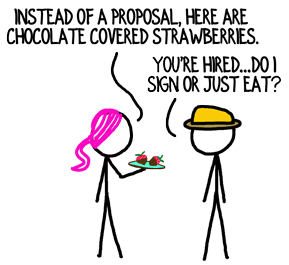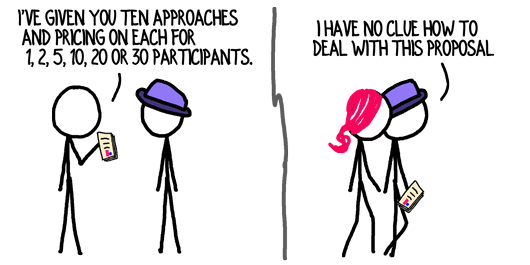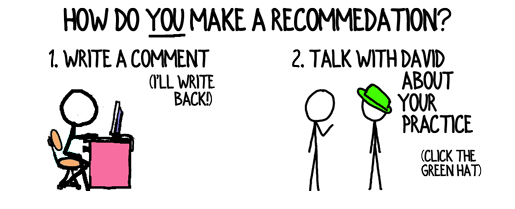There’s a phrase that will help your consulting firm close more, larger projects, faster.
You’ll use this phrase when you submit your consulting proposal (not in the proposal itself) and omitting this phrase is like forgetting to dip strawberries in chocolate. The oversight yields results that aren’t as reliably tasty or rewarding.

In all likelihood, your proposals for consulting projects are good already. (Particularly if you’re using the Perfect Proposal Template.)
You’ve crafted powerful proposals by always including a few alternatives, because you know alternatives are a critical continuation of the discovery process. They ferret out insights about preferences, risk tolerances, and boundaries for your project.
In some instances you may actually provide too many alternatives. A buffet of choices.
The buffet appears when your client pushes you to unbundle your consulting offering into individual, separate components. You might also present a buffet when you could be engaged for an undetermined number of instances (e.g., different individuals, groups, departments, divisions, service lines, geographies, etc.).
Alternatives are generally good, but there is a downside, especially as the number of choices climbs: choices add complexity to your client’s decision calculus. That can slow down the decision-making process and reduce the likelihood of the client choosing any alternative.

Hence, you need a few words that enhance the benefits of providing alternatives and mitigate the downsides.
That phrase you’re looking for is what I call an…
Empathic Recommendation
Any time you offer your consulting prospect alternatives, you should also help them navigate the choices. Remember, your clients are anxious and insecure about their decision to hire you. If they choose poorly, they have wasted valuable resources and they lose face.
Your guiding hand tamps down their fears and accelerates the decision process.
How you couch your recommendation matters.
For instance, saying, “I think you should…” is an okay lead into your recommendation, but not great.
- It can sound like a self-serving recommendation of the alternative that’s best for your consulting firm.
- “Should” is a judgment word, and your clients don’t want to feel judged for seriously considering a different alternative.
- It highlights a gap between your thinking and your client’s thinking if he leans toward an alternative other than your recommendation.
The Empathic Recommendation is subtly different. It sounds like this:
“If I were in your shoes, I would…”
This particular phraseology reinforces that you’re acting in your client’s best interests.
It also imputes social proof to back up his decision if he agrees with your recommendation.
If your client favors an alternative other than your recommendation, he’ll feel like he hasn’t fully shared with you what being in his shoes is like. That’s much better than him feeling like your consulting firm’s thinking isn’t aligned with his.
By always including an Empathic Recommendation, you increase the likelihood of winning a consulting project, you decrease the decision-making time, and you can guide your clients to select more valuable, richer alternatives.
What language do you use when you guiding your clients through choices in your proposals?
Text and images are © 2024 David A. Fields, all rights reserved.

 David A. Fields Consulting Group
David A. Fields Consulting Group 

Nice formulation. Mirrors the concept with a doctor of asking “if one of your relatives had this condition, what would your recommend for them”.
Excellent parallel, Ian…. of course, it depends on whether or not you like your relatives!
By the way, breakfast in Valencia (Spain) yesterday morning. Horchata, and look at all that tasty chocolate…
Thank you. I agree the word should is a powerful negative. A better way to influence someone to undertake a step forward is to add in the benefit to the client in choosing a particular option.
This approach has worked in many difficult conversations I have managed in a range of circumstances.
Absolutely, Rhonda. When you say what you would do were you in their shoes, you provide the rationale, of course. It sounds like you’ve used this approach very effectively and I’m glad you provided a case study.
If I were in your shoes, David, I’d take one of each.
Now you’re talkin’ like a consultant!
We’re on the same wavelength, David.
I’m not sure you understand my situation. I will need at least 3 of each. Delivered tomorrow!
Overnight delivery is by plane. Since my flight back from Spain was an all-day trip, somehow there were no pastries left for delivery when we landed. Drats! Sorry, Paula.